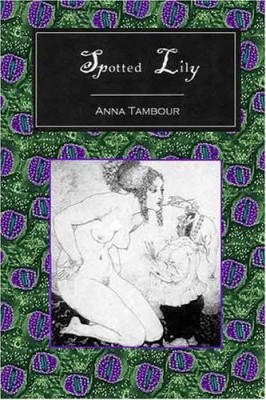The 2005 Snapshot
Australian Speculative Fiction: writers, editors, publishers
Anna Tambour
Anna Tambour
Interview by Ben Peek
 Anna Tambour is the author of Spotted Lily, what Keith Brooke called "a deal-with-the-devil story unlike any other you'll have read." Her story 'The Emperor's Backscratcher' is up at Infinity Plus.
Anna Tambour is the author of Spotted Lily, what Keith Brooke called "a deal-with-the-devil story unlike any other you'll have read." Her story 'The Emperor's Backscratcher' is up at Infinity Plus.
1) You've really established yourself outside of Australia, to such an extent that, despite a collection and a novel, you might not be known here. What then, are the things that get you to begin a piece of work, what is it you wish to explore?
The weird world, otherwise known as the 'real world'--the known, the unknown, and the uproariously, tragically, inscrutably and outrageously figmental--vibrates my viscera. Often it's a headline or the story behind what isn't written, such as 'Tracking leads to vole's sex upset' and 'He threw pieces of tart at the police' and 'Pope's last words'. History and the non-human are always as much a part of this 'real world' as a drop of water is to the ocean.
2) Within the local scene, do you feel there is much of an outlet for work like yours, which is often described as offbeat due to narrators such as a donkey (telling the tale of Robert Louis Stevenson, no less)?
Much of my work, including my novel, has been set in Australia, as it's such a rich environment for fiction, so I hope there is an outlet. 'Offbeat' should be a plus in fiction, not a 'hmmmm'. Otherwise, we could just all read washing powder labels, and have done with originality.
3) How important is the history of the speculative fiction genre to your work?
Fairy tales are fun to play with. But then so is religious dogma. And so are old censuses and and royal pronouncements and advertisements and the Decameron. But thinking in terms of the history of speculative fiction genre is an un-'me' thought pattern.
4) You're dead. The donkey. Well. That donkey wasn't happy. You should have not had read him Animal Farm after the horse died. Anyhow, whatever, you're dead. You're in Heaven (assuming you believe, blah blah) and you see God. What do you say?
An assumption, indeed! But say I'm in this Heaven. Which god do I see? If it's the Christian god, then I suppose I could say, 'If you're looking for a fourth, I don't play bridge.' If it's Ganesh, I'd sit on his lap and play with his trunk.
5) Favourite swear word?
I used to make merchant seamen blush, but I got bored with standard English swear words when they became thought of as 'edgy' by people who aren't, which made them instant cliches. Now I prefer the long curses. In Farsi, for instance, there is no equivalent to the one-word English yawners. There are only long plot-filled curses, but English was once full of those plot-boilers, too, like this one from Shakespeare that I'm partial to: 'You'll be rotten ere you be half ripe.' But if someone said, 'You'll be shot at sunrise unless you choose a one-word-favourite swear word,' I'd probably say, 'Bloody hell, then it'll have to be "codswallop".'
©2006 Go to top

